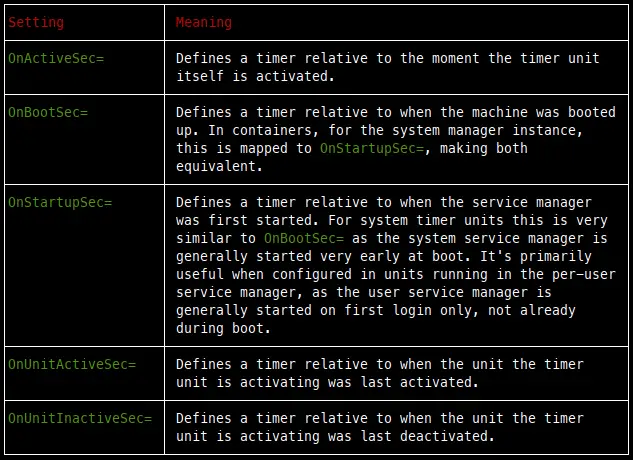On today’s tutorial, we’ll teach you how to use Systemd Timers to configure Cron Jobs in Linux. You may use timers instead of cron to schedule tasks while using systemd as the system and service manager. Timers are systemd unit files with the .timer suffix, and each one must have a matching unit file that defines the unit that will be triggered when the timer expires. A timer initiates a service with the same name as the timer, except for the suffix.
Understanding Cron | Systemd Timers
a.) Cron
Cron may plan a job to execute at many points of time, from minutes to months and beyond. It’s easy to set up, as it only requires one configuration file. Despite the fact that the configuration line is a little obscure. It may also be utilized by non-technical people. Cron, on the other hand, will fail if your system is not operating at the right execution time.
b.) Systemd Timers
Systemd Timers combine the finest features of cron. Allows for minute-level precision in scheduling. Even if the system was turned off within the intended execution period, this ensures that the job will be completed when it is restarted. All users have access to it. In the environment where it will execute, you may test and debug the execution. The configuration, on the other hand, is more complicated, needing at least two configuration files, one for the timer unit and one for the service unit.
Systemd Timers Configuration
The timetable is defined by the timer unit file, whereas the task(s) is defined by the service unit file. To execute the required functions, you’ll also need a job file or script. man systemd.timer provides further information on the timer unit. man systemd.service provides further information about the service unit. Unit files can be found in a number of places (listed in the man page). However, your service can be launched under the /etc/systemd/system/ directory.
Configuring Cron Jobs in Linux using Systemd Timers
This demonstration shows how to create a system-scheduled job. It creates a file that contains the files from the /etc directory.
1. Create a Shell Script that will Perform the Task
First of all we create a script file under /etc/systemd/system directory i.e /etc/systemd/system/my-task.sh file.
sudo touch /etc/systemd/system/my-task.sh2. Add the Following Contents to the Script File Above
Open the script file with your favorite editor add the following contents;
sudo vim /etc/systemd/system/my-task.shAdding contents to the file;
#!/bin/sh
echo "This is the list of files under /etc directory: $(ls -alh /etc)" >> "/etc/myfiles.txt"The above shell scrip will list the files of /etc directory and append to myfiles.txt file under ~/etc directory.
3. Make the Script Executable
Run the following command to make the script executable.
sudo chmod +x /etc/systemd/system/my-task.sh4. Create the .service Unit
Make the .service unit that will run the script mentioned above. Create a file in the /etc/systemd/system/ directory.
i.e
sudo touch /etc/systemd/system/my-task.serviceEdit the file above and add the following contents;
sudo vim /etc/systemd/system/my-task.serviceContents of the above file.
[Unit]
Description=A job to list /etc directory files
[Service]
Type=simple
ExecStart=/etc/systemd/system/my-task.sh
[Install]
WantedBy=default.targetEnable the created service above;
systemctl enable my-task.service
Created symlink /etc/systemd/system/default.target.wants/my-task.service → /etc/systemd/system/my-task.service.Now start the service by running the following command;
systemctl start my-task.serviceCheck the service status;
$ systemctl status my-task.service
● my-task.service - A job to list /etc directory files
Loaded: loaded (/etc/systemd/system/my-task.service; enabled; vendor preset: enabled)
Active: active (running) since Tue 2025-02-18 14:20:01 EAT; 9s ago
TriggeredBy: ● my-task.timer
Process: 1480009 ExecStart=/etc/systemd/system/my-task.sh (code=exited, status=0/SUCCESS)
Main PID: 1480009 (code=exited, status=0/SUCCESS)
Jul 31 14:20:01 cloudspinx systemd[1]: Started A job to list /etc directory files.
Jul 31 14:20:01 cloudspinx systemd[1]: my-task.service: Succeeded.5. Create the .timer Unit
Make a .timer unit file that schedules the .service unit you just made. It should be saved in the same directory as the .service file.
e.g /etc/systemd/system/ directory.
sudo touch /etc/systemd/system/my-task.timerEdit the file above and add the following contents;
sudo vim /etc/systemd/system/my-task.timerContents of the above file.
[Unit]
Description=List the files of /etc directory every minute
RefuseManualStart=no
RefuseManualStop=no
[Timer]
#Execute job if it missed a run due to machine being off
Persistent=true
#Run 120 seconds after boot for the first time
OnBootSec=120
#Run every 1 minute thereafter
OnUnitActiveSec=60
#File describing job to execute
Unit=my-task.service
[Install]
WantedBy=timers.targetEnable the created timer above;
systemctl enable my-task.timer
Created symlink /etc/systemd/system/timers.target.wants/my-task.timer → /etc/systemd/system/my-task.timer.Now start the timer by running the following command;
systemctl start my-task.timerCheck the timer status;
$ systemctl status my-task.timer
● my-task.timer - List the files of /etc directory every minute
Loaded: loaded (/etc/systemd/system/my-task.timer; enabled; vendor preset: enabled)
Active: active (waiting) since Tue 2025-02-18 13:33:48 EAT; 44min ago
Trigger: Sat 2025-02-10 14:18:45 EAT; 51s left
Triggers: ● my-task.service
Jul 31 13:33:48 cloudspinx systemd[1]: Started List the files of /etc directory every minute.A [Timer] section in a timer file must contain information about the timer it specifies. The following are the settings unique to the [Timer] part of timer units as per man 5 systemd.timer.
- OnActiveSec=
- OnBootSec=
- OnStartupSec=
- OnUnitActiveSec=
- OnUnitInactiveSec=
The above defines monotonic timers relative to different starting points.
The following is Settings and their starting points.

Specifications for Calendar Event
Calendar event parameters are an important component of setting up timers to run at particular intervals. DOW YYYY-MM-DD HH:MM:SS is the fundamental format for systemd timers using OnCalendar=.
Some common time requirements used in OnCalendar statements are shown below.
| Calendar event specification | Description |
| Weekly | Every Monday at 00:00:00 |
| *-*-* 00:20:30 | Every day of every month of every year at 20 minutes and 30 seconds after midnight |
| Mon | Same as weekly |
| Wed 2025-*-* | Every Wednesday in 2025 at 00:00:00 |
| Mon *-*-* 00:00:00 | Same as weekly |
| 2025-6,7,8-1,15 02:30:00 | The 1st and 15th of June, July, and August of 2025 at 02:30:00am |
| Mon..Fri *-09~05 | The 5th day preceding the end of September for any years in which it also falls on a weekday. |
Checking Scheduled Tasks
We can now check the scheduled task above by displaying the contents of myfiles.txt file in /etc directory using cat command.
$ cat /etc/myfiles.txt | less
This is the list of files under /etc directory: total 1.4M
drwxr-xr-x 161 root root 12K Jul 31 13:09 .
drwxr-xr-x 20 root root 4.0K Sep 1 2020 ..
drwxr-xr-x 3 root root 4.0K Apr 2 2020 acpi
-rw-r--r-- 1 root root 3.0K Apr 2 2020 adduser.conf
-rw-r--r-- 1 root root 0 Jun 19 09:24 aliases
drwxr-xr-x 3 root root 4.0K Apr 2 2020 alsa
drwxr-xr-x 2 root root 12K Jun 29 11:34 alternatives
-rw-r--r-- 1 root root 401 Jul 16 2019 anacrontab
drwxr-xr-x 8 root root 4.0K Jul 7 08:48 apache2
-rw-r--r-- 1 root root 433 Oct 2 2017 apg.conf
drwxr-xr-x 5 root root 4.0K Apr 2 2020 apm
drwxr-xr-x 3 root root 4.0K Dec 5 2020 apparmor
drwxr-xr-x 8 root root 4.0K Jul 7 08:48 apparmor.d
drwxr-xr-x 4 root root 4.0K Jun 17 08:55 apport
-rw-r--r-- 1 root root 769 Jan 18 2020 appstream.conf
drwxr-xr-x 7 root root 4.0K Jul 8 20:28 apt
drwxr-xr-x 3 root root 4.0K Jul 13 08:23 avahi
-rw-r--r-- 1 root root 2.3K Feb 25 2020 bash.bashrc
-rw-r--r-- 1 root root 45 Jan 26 2020 bash_completion
drwxr-xr-x 2 root root 4.0K Jun 17 09:22 bash_completion.d
-rw-r--r-- 1 root root 367 Jan 27 2016 bindresvport.blacklist
drwxr-xr-x 2 root root 4.0K Mar 24 2020 binfmt.d
drwxr-xr-x 2 root root 4.0K Jun 20 08:49 bluetooth
drwxr-xr-x 2 root root 4.0K Jun 8 22:22 bonobo-activation
-rw-r----- 1 root root 33 Apr 2 2020 brlapi.key
drwxr-xr-x 7 root root 4.0K Apr 2 2020 brltty
-rw-r--r-- 1 root root 27K Mar 3 2020 brltty.conf
drwxr-xr-x 3 root root 4.0K Apr 2 2020 ca-certificates
-rw-r--r-- 1 root root 6.5K Jun 17 09:10 ca-certificates.conf
-rw-r--r-- 1 root root 6.4K Dec 5 2020 ca-certificates.conf.dpkg-old
drwxr-xr-x 2 root root 4.0K Apr 2 2020 calendar
drwxr-s--- 2 root dip 4.0K Sep 12 2020 chatscripts
drwxr-xr-x 2 root root 4.0K May 22 09:54 chrony
drwxr-xr-x 2 root root 4.0K Sep 1 2020 console-setup
drwxr-xr-x 2 root root 4.0K Sep 4 2020 cracklib
drwxr-xr-x 2 root root 4.0K Jun 19 09:24 cron.d
drwxr-xr-x 2 root root 4.0K Jul 8 20:41 cron.daily
drwxr-xr-x 2 root root 4.0K Apr 2 2020 cron.hourlyStopping Systemd Timers
You can stop systemd timers starting with service unit followed by timer unit as follows;
#stopping the service unit
sudo systemctl stop my-task.service
#stopping the timer unit
sudo systemctl stop my-task.timerConclusion
This concludes our lesson on how to configure Cron Jobs in Linux using Systemd Timers. We hope you found this information useful. Stay tuned for more such lessons. Cheers!
Linux System Administration Video Courses:
- Complete Linux Training Course to Get Your Dream IT Job
- Linux Administration Bootcamp: Go from Beginner to Advanced
- Linux Shell Scripting: A Project-Based Approach to Learning
- Linux Mastery: Master the Linux Command Line in 11.5 Hours
- Learn Linux in 5 Days and Level Up Your Career
- Complete Linux Bash Shell Scripting with Real Life Examples









